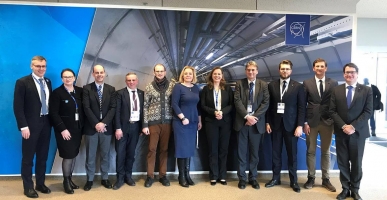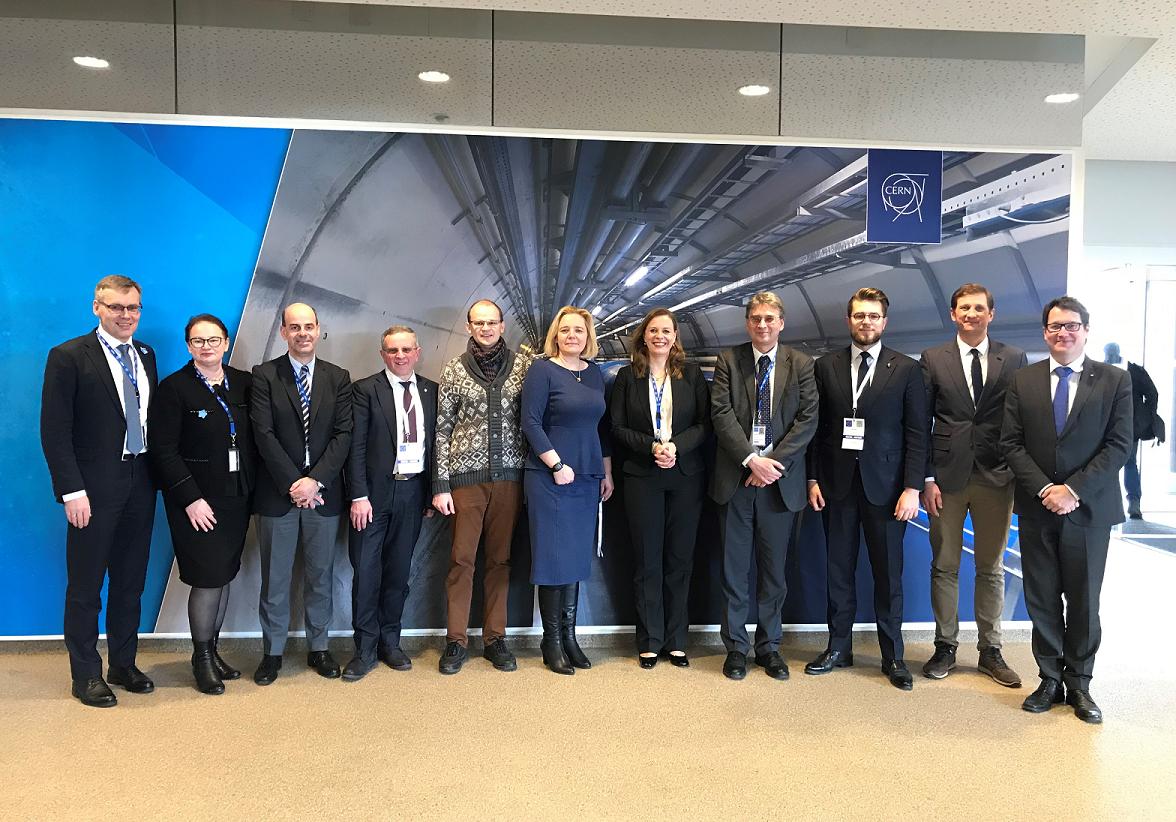Events
A Year of Lithuania Associate Membership at CERN
11 01 2019
A year of Lithuania associate membership at CERN
On 11 January 2019 the President of the Lithuanian Academy of Sciences Jūras Banys visited CERN and participated in the Lithuania-CERN Committee meeting, discussing with the CERN officials the first year of the Lithuania associate membership (AM) at CERN. The report on Lithuania’s participation in the CERN scientific programme and perspectives for the future, prepared by the CERN Coordination Committee in Lithuania, was delivered by Professor J. Banys.
The report started with mentioning the policy measures that accompanied the application of Lithuania for obtaining the new AM status. In 2016, the National Strategic Council for Research, Development and Innovation chaired by the Prime Minister approved the Action Plan on CERN Associated Membership for the years 2017-2021, appointing the Ministry of Education, Science and Sport as the main coordinator and the Ministry of Economy and Innovation in charge of industrial networking and establishment of CERN BIC. In 2018 the Confederation of Lithuanian Industrialists was nominated as Liaison Office for CERN in industry and the Academy of Sciences as Liaison Office for CERN in research, development and innovation. Also, a national committee for CERN activities under the Academy of Sciences was established.
The report noted that during the recent years strong partnership has been maintained between the President Office, the Government, business and academic stakeholders to enhance the activities in CERN related areas. Moreover, the collaboration with Latvia and Estonia regarding CERN areas of interests and the share of best practices has been developed with the endorsement of CERN and in cooperation with the higher education institutions of Estonia and Latvia. the CERN Baltic Group (CBG) was established aiming to foster particle physics and accelerator technology research and education community in the Baltic states. Two major Lithuanian universities – Kaunas University of Technology (KTU) and Vilnius University (VU) – signed the CBG Memorandum of Understanding (MoU) in May 2018 at CERN.
After the the AM proper came into force on 8 January 2018, Lithuania achieved a marked progress in relevant R&D, university studies, and education and outreach domains. The Action Plan for Involvement in CERN Activities by the (then) Ministry of Education and Science for the years 2018–2020 was being implemented. Six groups of researchers from Kaunas University of Technology, Lithuanian University of Health Sciences and Vilnius University received dedicated funding for carrying out projects directly related to R&D at CERN and also prepared applications to other sources, both national and international, building partnerships and seeking support. Five new courses in experimental and theoretical particle physics and closely-related IT subjects at bachelor level at VU were introduced and several existing courses were modified to include topics related to the high energy physics (HEP).
The Outreach group of the VU Experimental Nuclear and Particle Physics Centre (VU Centre), its partners and individual researchers organized a number of successful actions and events popularizing HEP for students, schoolchildren and general public. Among those, the “International MasterClass: Hands on Particle Physics 2018” (organized by International Particle Physics Outreach Group – IPPOG) was moderated together with the Vilnius Gediminas Technical University staff, and around 80 participants, mainly schoolchildren, could visit laboratories of the Center for Physical Sciences and Technology. The CMS virtual visit for Lithuania was hosted by KTU on on 28 September 2018 as part of the European Researchers’ Night event. On 6 November 2018 the CERN Honorary Member François Flückiger participated in the “Annual Economic Forum ‘18” conference organized by the Confederation of Lithuanian Industrialists (LPK) and delivered a lecture “Business and Science Cooperation in Information Technology: The CERN Case”.
The appointed industrial liaison officer (ILO) of Lithuania initially was Mrs. Gražina Tarvydienė from the LPK, who recently left her position there and the new nomination is pending. Dr Aurelijus Rinkevičius, the nominated permanent Chair of the VU Centre, started planning the future activities for the Centre envisioning the perspectives of international networking and prototype production for CERN.
The Lithuanians IT engineers at CERN continued their important and valued service work for the LHC experiments in 2018: Rokas Mačiulaitis received the CMS achievement award, joining a number of other Lithuanians throughout the years, “for his excellent contributions to the Facilities group in Software and Computing”, nominated by the MIT assoc. prof. Markus Klute.
Representatives of Lithuania – the Ambassador Andrius Krivas, Prof. Jūras Banys, Prof. Eugenijus Butkus, Prof. Leonas Valkūnas, Dr Andrius Juodagalvis, Dr Aurelijus Rinkevičius – regularly participated in the sessions of CERN Council and meetings of its committees. The concise reports on the topics discussed and actions approved at the meetings are available in the Lithuanian language on the Lithuanian Academy of Sciences web page http://www.lma.lt/ataskaitos. The financial duty of year 2018 for CERN was fulfilled, too.
The first year of CERN associated membership showed that both academic and business sectors have many challenges in absorbing the possibilities of the AM. It should be acknowledged that the performance of research and industry in CERN related areas remains one of priorities on political agenda.
Prepared by Andrius Bernotas following the report of CERN Coordination Committee in Lithuania

Participants of the CERN-Lithuania Committee meeting on 11 January 2019 at CERN (from the left): Mr Andrius Krivas, Ambassador, Permanent Representative of Lithuania, Ms Renata Rinkauskienė, Counsellor, Permanent Mission of the Republic of Lithuania, Prof. Emmanuel Tsesmelis, Head of Associate Member and Non-Member State Relations, Mr Gintaras Vilda, Vice-Minister, Ministry of Economy and Innovations of the Republic of Lithuania, Dr Aurelijus Rinkevičius, Designated Chair of Particle Physics, Vilnius University, Dr Saulė Mačiukaitė-Žvinienė, Advisor to the President of the Republic of Lithuania, Mrs Charlotte Lindberg Warakaulle, Director for International Relations, Prof. Jūras Banys, President of the Lithuanian Academy of Sciences, Mr. Lukas Savickas, Adviser to the Prime Minister of the Republic of Lithuania, Dr Mantas Vilys, Director at Lithuanian Innovation Centre, Prof. Christoph Schäfer, Senior Adviser for International Relations.
